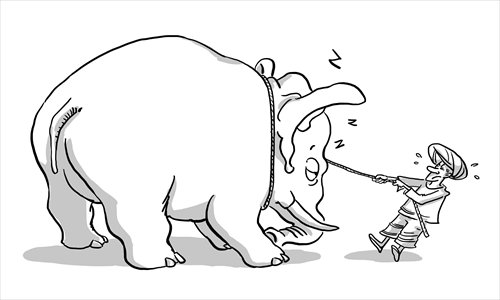Democracy lets tradition thwart law in India

The gang rape of a Swiss tourist in India over the weekend has attracted wide attention. The Indian rape epidemic has not only shocked the world, but shamed the country which prides itself on being the largest democracy in the world. The frequent rape cases cast a shadow on the quality of Indian democracy.
India's rape problem comes from two things. India has a deeply rooted social discrimination against women. And India's rule of law is loose and government management is lacking.
These two things are closely linked to each other, and directly decide the level of India's social progress and the quality of its democracy.
There are both pluses and minuses in the traditional culture and social habits of any nation. The process of modernization is accompanied by changes in social customs, and the rivalry between tradition and modernization can be fierce.
India has long entered the rank of democratic countries and started its modernization. However, the country stays in the past when it comes to the status of women.
Even in the 21st century, there are still obsolete social customs such as forced marriage and widow-burning. The frequent rapes mirror such bad social habits.
The largest democracy still maintains the most backward practices in the world. Such a sharp contrast highlights the weakness and incompetence of India's democratic system.
Nobel laureate V.S. Naipaul once said, "The crisis of India is not only political or economic. The larger crisis is of a wounded civilization that has at last become aware of its inadequacies and is without the intellectual means to move ahead."
Raising women's status and giving them equal rights requires dispelling old habits through changing social perceptions. But meanwhile, legal methods are also needed to make new rules and protect women from assaults. Both are indispensable.
Many developing countries heading toward modernization are gradually accomplishing this basic procedure. But this seems especially difficult in India. The reason lies in India's democracy.
Indians' complaints over their slow modernization are frequently heard. Such slowness largely stems from India's democracy, which is hindering the nation's progress.
The power of tradition is colossal. India's democracy not only enables those deeply rooted bad habits to survive, but even further fosters them.
There is a metaphor that India's democracy is a giant mosaic in which varied cultures are inlaid and coexist. People go on their one way in the democratic system and live together peacefully, no matter how backward some cultures appear.
If there is no external enforcement, those who live by and revere tradition will always vote for tradition. As a result, there is no single person, or any one administration, that has the power and authority to thoroughly remove outdated customs.
There are numerous examples in the world which have proved that democracy and rule of law do not move forward simultaneously at times. An advancing democracy accompanied by a retreating rule of law often means disorder.
Why does India's democracy fail to bring more effective rule of law, but instead allows the worst facets of traditions to flourish and thus severely restricts India's modernization to this day? This is, I'm afraid, a question that deserves thought from the Indian elite.
The author is a senior editor with People's Daily. He's now stationed in Bangkok. dinggang@globaltimes.com.cn